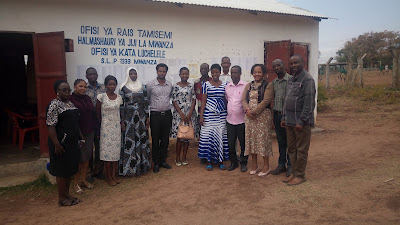Last Friday 17th of January Nora and Ellen,
volunteers from Finland, joined the session for the first time. As it was the
first time we met we only started with a basic introduction. First Nora and
Ellen introduced themselves with their names and what they’re doing here and
where they are coming from. After that it was each girls turn. They seemed a
bit shy and talked pretty slowly and silently. Most of the girls introduced
themselves in Swahili. One of the girls hid herself under a table. We wrote her
name up and we’ll do a follow up on if there’s something that caused this
behavior, or if she’s only shy. Amalath and Jani who also attended as mentors
have met the girls before on earlier sessions, and they saw an improvement in
most of the girls’ confidence.
After the introduction Nora and Ellen asked the girls
a few questions. One was “what do you want to become when you grow up?”
Everyone was very eager to answer. They did repeat each other pretty much, and
we noticed that it seems like the girls don’t know much about which kind of
career possibilities there are. Some of the answers were doctor, teacher,
pilot, engineer, nurse, sister and so on. One of the girls wanted to become a
president. Another question was “What is your favorite food?” some of the
answers were banana, meat, rice, chips, pilau, cake and ugali. This can be used
in upcoming sessions as questions to them why they should eat more of some
foods and why they should avoid others. Nutrition is a significant part of a
healthy lifestyle and it can be good for the girls to questions their own
habits. In that way it is easier for them to get an understanding of nutrition,
when it comes from their own perspective.
The last question was “What do you like to do in your
free time?” Many of the girls answered that they enjoy playing different
sports, as football and netball. Someone also answered reading and playing.
Then it was the girls turn to ask Nora and Ellen questions. They were curious
to know about how old Nora and Ellen are, where they come from, what they do,
what university they go to and where they live in Mwanza. We noticed that the
girls were much more confident when the atmosphere was more freely. It is more
out of their comfort zone to one by one stand in front of the other girls and
speak. But the best way to keep developing and improving is to get out the
comfort zone again and again.
There weren’t many challenges during this session,
except for that there were other children who would have liked to attend too,
as boys and girls who were younger than 10. It is a pity that everyone can’t
attend, but the reason to this is that there are topics that aren’t suitable
for girls younger than 10. It is also good for girls to have an environment
where there are no boys, so they can talk about things they wouldn’t talk about
in front of the boys. It is also more usual that boys get more attention than
girls, so that’s another point on why it is good for the girls to have a space
only for girls.







